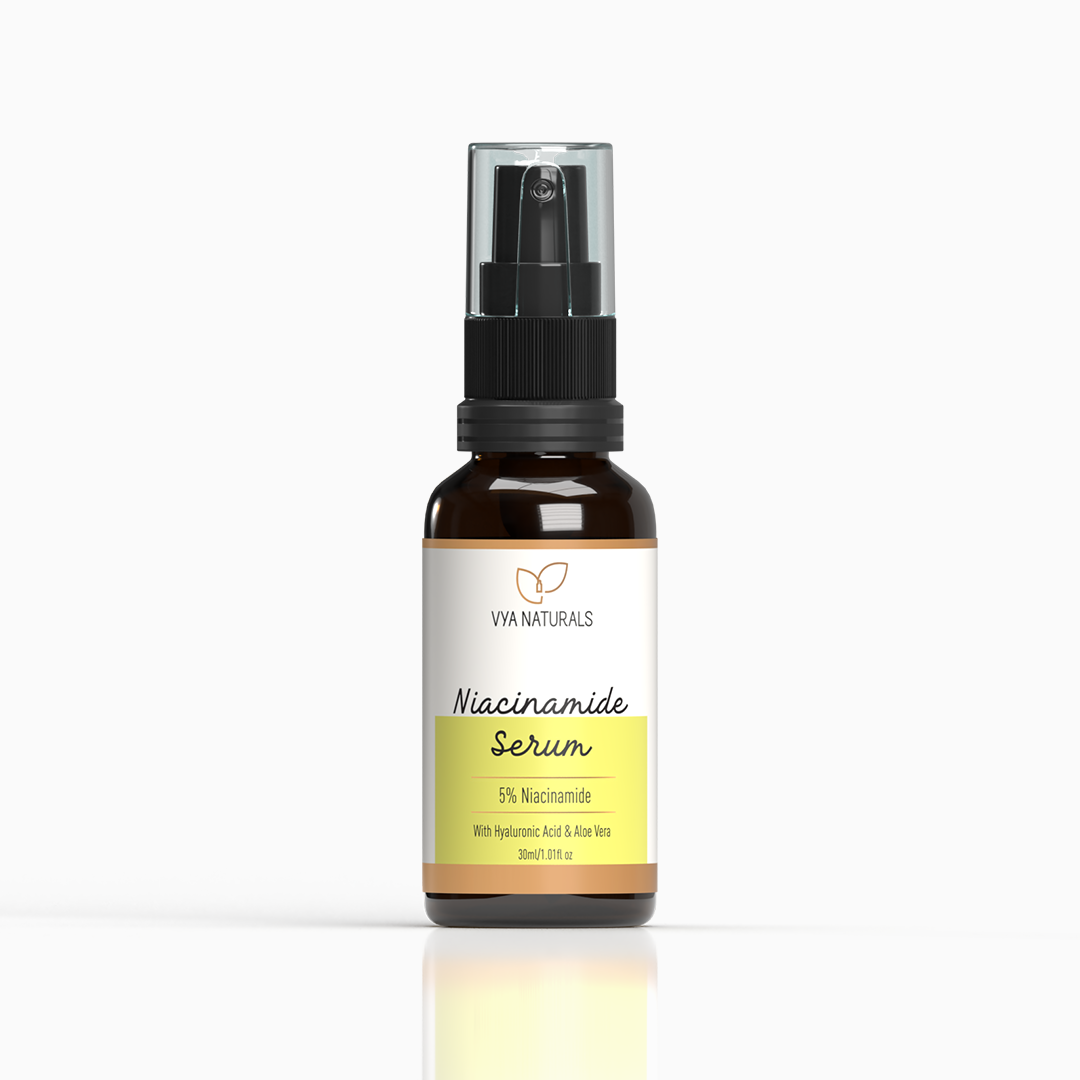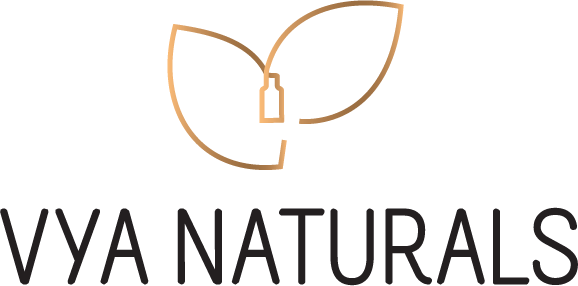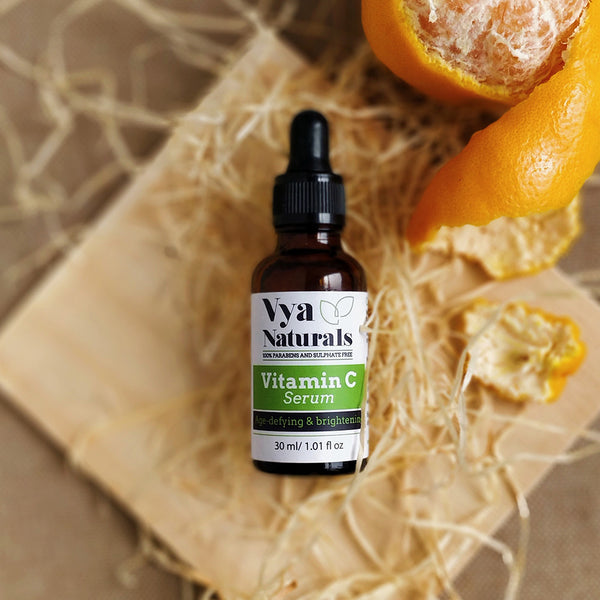From eating it in the form of citrus fruits to using Vitamin C rich products for skincare, we can all relate to Vitamin C in one way or the other. However, Vitamin C is a lot more than that. Here are answers to some of the most asked questions about Vitamin C.
What is Vitamin C?
Vitamin C is an AHA, (Alpha Hydroxy Acid) which is found naturally in several fruits, leaves & vegetables but not in human beings.
It is also known as L-Ascorbic acid or if one has to name its structure it goes by 2-oxo-L-threo-hexono-1,4-lactone-2,3-enediol also called as INCI name.
What are the different forms of Vitamin C used?
Vitamin C is used in the form of oral tablets, IV injections & cosmetic preparations.
What are the benefits of Vitamin C?
Vitamin C has several health benefits and is known as one of the most powerful anti-oxidant there is. We all need antioxidants to neutralize the free radicals that are produced in our bodies due to several environmental & nutritional reasons.
These free radicals can cause havoc with our bodies both internally & externally. Vitamin C strengthens the immune system and fights off free radical stress. Vitamin C is required by our body to synthesize collagen, to keep a smooth metabolic function and to keep the regeneration process going on.
How does Vitamin C work as a cosmetic ingredient? Is it clinically proven?
Vitamin C works on all skin types to even out and to brighten tone along with fading hyper-pigmentation, protecting against environmental aggressors, brighten skin tone, and promoting collagen and elastin production.

L-Ascorbic Acid products are clinically proven to penetrate the skin tissue and are more active in collagen production. This, in turn, increases firmness in the skin. L-Ascorbic Acid is a rejuvenating vitamin ingredient that also plays a part in the reduction of photo damage caused by harmful UVB rays. As L-Ascorbic Acid containing products play a major role in anti-aging treatments, skin firmness, overall repair and brightening, they also serve to rejuvenate the skin.
Conditions such as ageing skin, hyperpigmentation and post inflammation hyperpigmentation benefit greatly from L-Ascorbic Acid skin care products.
Can I not just ingest Vitamin C tablets to get healthy skin?
The benefits of oral Vitamin C both in its natural form and in oral tablets or intravenous injections is well documented.

However, in order to reach the outermost layer of the skin it has to traverse a complex path and skin being the distant part of the body to attend to, very insignificant amount is actually delivered. Topical applications have a direct benefit on skin, and a substantial amount is available to perform the function at the dermal level.
Can I not crush Vitamin C tablets and apply directly on the skin?
Vitamin C is an unstable molecule and upon contact with air gets converted to diketogluconic acid which doesn’t have any skin benefit.
Formulators stabilize Vitamin C in such away so as to deliver it to the consumer in a ready to use form. Several methodologies are used to render Vitamin C in a stable form.
What are the different types of formulations of Vitamin C for skincare?
Vitamin C ingredient is used in several formulations like creams, lotions, gels, cleansers, sprays, serums, masks, etc. Many of these products help to stabilize the ingredient and deliver to get the maximum efficacy. Different concentrations of Vitamin C & their derivatives are used.
Can I use Vitamin C formulation along with other ingredients?
Vitamin C in L-Ascorbic form is not recommended along with products containing Retinol and Niacinamide. It is safe for use with stabilized versions of Vitamin C. Due to its instability some of the cosmetic ingredients are not compatible and hence need to be selected scientifically. Also Vitamin C should not be used in the powder form as it is prone to deteriorate.
What are the other forms of Vitamin C?
Vitamin C is highly unstable and needs a very acidic pH to stabilise in the product. This can be irritating to sensitive skin types and can cause severe discomfort.
In order to avoid this, stabilized versions of Vitamin C are used, for e.g. Vya Naturals Vitamin C Serum, Hyaluronic Acid Serum with Vitamin C, Vitamin C Face wash, Vitamin C Moisturizer all use stabilized versions of Vitamin C.
Examples of stabilised Vitamin C are 3O Ethyl Ascorbate, Magnesium Ascorbyl Phosphate, Glyceryl Ascorbate, Ascorbyl Palmitate, THD Ascorbate etc. which metabolise to form Vitamin C and deliver the same effects from brightening to delivering the antioxidants to the skin.
Are there any side effects of using Vitamin C?
People with rosacea and sensitive skin conditions should avoid Vitamin C ingredient as it may cause irritation. Oily, dry and combination skin types can benefit greatly from L-Ascorbic Acid products. However Vya Naturals Vitamin C based products can be used for sensitive skin too as they are formulated to neutral pH (Non acidic ). As with any skincare product, consumers should perform a patch test before using Vitamin C product to confirm their tolerance.
Does Vitamin C have skin healing benefits?
Vitamin C can help promote wound healing and repair skin as per a study done on human fibroblasts.
Can I use Vitamin C on Hair?
Although several products with Vitamin C products are available in the market to reduce hair thinning, scientific studies are still being conducted to prove the claim. Also Vitamin C in a complex form present in Amla is known to provide benefits on hair.
How is Vitamin C made? What are the natural sources of Vitamin C?
Vitamin C is made by a multi-step process starting with Glucose.

Besides citric fruit like lemon & orange, Vitamin C is widely present in spinach, bell peppers, strawberry, green capsicum, papaya, kale, guava, broccoli, litchi etc. in significant amounts.
Is Vitamin C used for treatment against Covid19?
Clinical trials are being carried out at several institutes throughout the world to determine whether Vitamin C given intravenously or orally helps to reduce morbidity in severe cases.
Fun Fact about Vitamin C
Thiamine Riboflavin Niacin Pantothenic Acid Pyridoxine Folate Cobalamin Ascorbic Acid Beta-Carotene Alpha-Tocopherol Calciferol.
All the above names are that of different Vitamins, Ascorbic Acid is Vitamin C.
CONCLUSION
In a nutshell, Vitamin C in Cosmetics is used as an antioxidant to protect skin from environmental damage. It helps skin to produce more collagen to give anti ageing benefits and helps treat hyperpigmentation, acne, scars & even out the skin tone.




4 comments
Nice technical write-up with quite a lot of information, advice & enduse products and its benefits. Appreciate. Respects & warm regards to Dr. Sanjay Devasthale🙏🏼.
Congratulations My dear brother Sanjay proud of u
Great article. Very informative. Please do share more articles
Congratulations Very interesting and educative We are proud of our great son-in-law